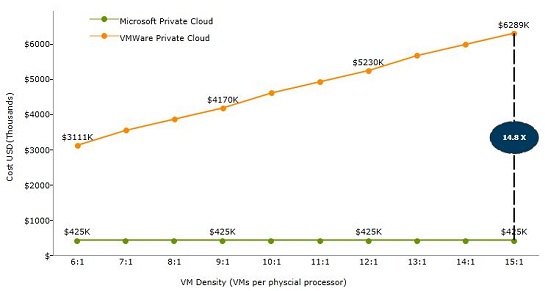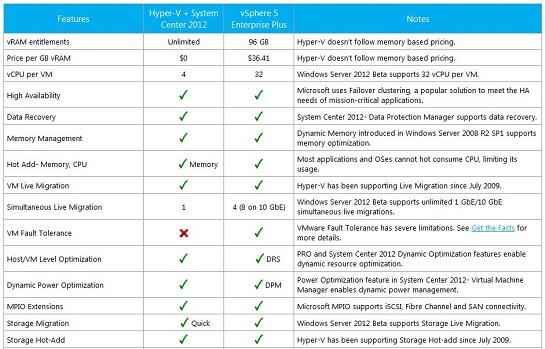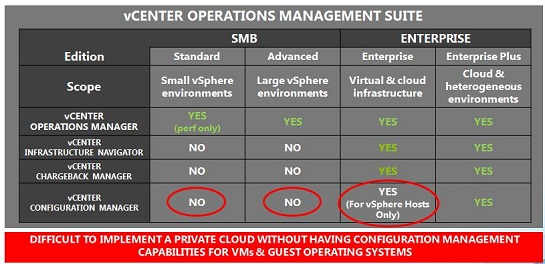The facts about the value of a Microsoft private cloud
Cloud computing, both private and public, is fundamentally shifting the IT industry and a primary driver of that trend is economics. At Microsoft, we believe that as your private cloud grows, you should benefit from economies of scale. In short, we believe our customers should get the best value with unlimited virtualization rights and lower costs — consistently and predictably over time.
To help our customers get information needed to make the best decisions, last year we published a whitepaper with analysis of how Microsoft’s private cloud delivers the best economics compared to others. We have also created a Private Cloud Economics Tool for you to run a customized analysis of your own environment.
Since the release of both the Whitepaper and Tool, there have been some questions from customers on some of the assumptions and calculations contained within both the whitepaper and Tool. Today, we’d like to take the time to address those questions and help you get the facts about Microsoft private cloud economics. We invite you to read on for a summary of the Private Cloud cost analysis, so you can use our new tool to begin your evaluation of the Microsoft private cloud.
Microsoft private cloud solutions are licensed on a per processor basis with unlimited virtualization rights. Microsoft’s licensing allows you to get the cloud computing benefits of scale with unlimited virtualization and lower costs – consistently and predictably over time. VMware’s private cloud solutions are licensed by either the number of VMs or the virtual memory allocated to those VMs – charging you more as you grow.
This fundamental difference in approach means that with VMware, your costs grow and your private cloud ROI decreases as your private cloud workload density increases. With Microsoft, your private cloud ROI increases, as your workload density does.
You can use Windows Server and System Center to build a Microsoft based private cloud solution. System Center 2012 provides a single SKU for an integrated private cloud management solution by integrating eight separate component products into one unified solution. To build a comparable VMware based private cloud solution, you will require multiple VMware products, including:
- VMware Cloud Infrastructure Suite products (vSphere, vCenter, vCloud Director, vCenter Site Recovery Manager (SRM), vShield).
- VMware Management Suites- vCenter Operations Management Suite (vCOPS), Service Manager, and vFabric Application Performance Manager (APM).
Some of these suites are bundles of multiple products and every product/suite above except vSphere, vCenter, and Service Manager is licensed on a per-VM basis. This introduces a new VMware tax you can think of as the VMware Density Tax. The graph below shows the impact of VMware density tax VMware charges per VM, so as your VM densities increase, your costs increase significantly, as you end up paying a separate licensing fee for every VM.
Get the facts about the value of a Microsoft private cloud:
Microsoft Windows Server and System Center provide a better, more integrated Private Cloud functionality than other solutions, such as VMware’s Cloud Infrastructure Suite.
At Microsoft, we don’t believe in separating marketing from product reality. System Center 2012, along with Windows Server, offer a range of advantages over VMware suites, including deep application insight, heterogeneous management, extensibility to work with third party or custom solutions, public and hybrid cloud management, and deep product integration.
VMware’s CTO, Dr. Stephen Herrod said it better than we could at a recent VMUGIT event (scroll to the YouTube video at 3:12).
“VMware Cloud Infrastructure Suite is really more of a marketing term. Those of you know our products deeply know that they don’t fit this well together as they need to. Some of them have multiple databases, some don’t look the same, some install differently, and what I can’t stand that is Site Recovery Manager doesn’t currently work with vCloud Director. So, what we are basically able to say is that we created and acquired companies that led to a lot of individual products that don’t work well enough together yet.”System Center 2012 and Windows Server 2008 R2 SP1 Hyper-V offers functionality found in the highest edition of VMware vSphere 5, Enterprise Plus, without charging a memory tax.
When you actually look at the specific comparisons, you can see that the Microsoft products align well against vSphere Enterprise Plus. The table below shows a snapshot of feature comparisons. The entire table can be seen in this calculator output.
Additionally, to actually implement a private cloud with VMware, you would need to also buy VMware’s vCenter Operations Management Suite, along with additional VMware products. To match up with the functionality of System Center 2012, you would need to purchase vCenter Operations Management Suite Enterprise Plus, priced at $34,250 for 25 VMs (only license cost, support extra), as well as other VMware products like VMware Service Manager, vCenter SRM, vCloud Director, vShield Endpoint and vFabric APM.
When creating our price comparison, we use the most accurate, current, public pricing available, including support on both sides. All comparisons use a publically available, non-discounted product price list, which is refreshed every month. You can find the U.S. Estimated Retail Price List available here. You can also always check the publically available Private Cloud Economics Tool (detailed cost breakdown in the output) that shows we include our support cost, Microsoft Software Assurance, which amounts to 25% of license price/year in our costs.
In the publically available Private Cloud Economics Tool, we have multiple options allowing you to pick the right Microsoft license vehicle for your company. Within the Tool, you choose your inputs and the Microsoft cost output can be either in Windows Server + System Center or Enrollment for Core Infrastructure (ECI), which brings the two together in a Volume Licensing agreement:
-
- For customers purchasing Microsoft private cloud for more than 50 processors, ECI is the most cost-effective and simple licensing solution (buy 1 SKU)
- Customers purchasing less than 50 processors can buy Windows Server and System Center separately (buy 2 SKUs)
We encourage you to try the Microsoft Private Cloud Economics Tool and the Server Virtualization calculator to compare Microsoft and VMware private cloud costs and features.
The IDC Report Delivering Private Clouds today with System Center 2012 sums up our Economics argument- “System Center 2012 directly addresses today's most important private cloud management requirements and provides customers an affordable option for getting started now and for scaling up over time.”
Thank you for reading!
---Edwin


